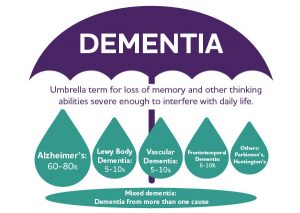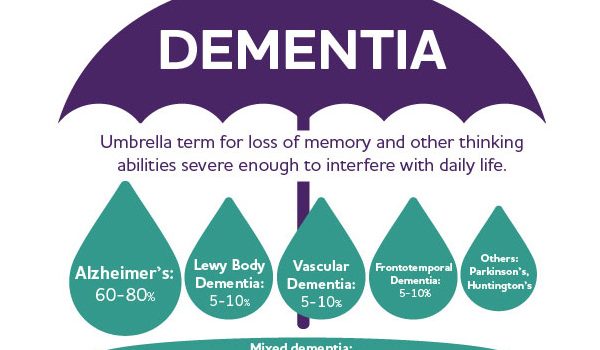An Ultimate Guide to Types of Dementia
Long life is something virtually everyone desires. But as we grow older, our body systems tend to get weaker and turn against us. And dementia is one of those things seniors are at risk of. Not that it’s a normal part of the ageing process, but it can occur, unfortunately.
There are different types of dementia, but before going into that, let’s understand what dementia is.
What is Dementia?
Dementia is a progressive brain disorder that causes impairment in cognitive ability, such as memory loss.
As a person ages, the brain goes through considerable modifications. One of such modifications is brain shrinkage, which begins after 60. Cells also begin to wear out and no longer regenerate.
Typically, dementia is caused by damage to or loss of nerve cells in the brain. This may result in difficulty remembering things, which can be severe enough to hamper the individual’s social life.
Although memory loss is often associated with dementia and is considered one of its early signs, it’s often not a determinant of the condition. One can have memory loss but not have dementia.
General Symptoms of Dementia
Dementia symptoms vary depending on the area of the brain affected. That’s the reason why people experience dementia differently.
However, some conditions that look like dementia may not be it, such as those resulting from medication or vitamin deficiency. Such conditions typically improve with treatment over time.
Generally, the symptoms of dementia include:
- Memory loss
- Difficulty reasoning and analyzing problems
- Difficulty handling logical tasks
- Difficulty coming up with the right words
- Frequent confusion and disorientation
- Loss of ability to organize and plan
- Loss of coordination
- Getting lost while walking or driving around a familiar environment
If you notice some of the following in yourself or an elderly loved one, it is likely dementia.
Causes of Dementia
Many things cause dementia (damage to brain cells). Depending on the cause, the condition is either reversible or irreversible (progressive). But we generally don’t regard the irreversible one as actual dementia because, although the symptoms are virtually the same, it is not progressive. It can be treated. Actual or progressive dementia doesn’t get better with time. It’s the opposite.
The 5 Types of Dementia
There are typically five types of progressive dementia.
Alzheimer’s Disease
Alzheimer’s disease is the most common type of dementia. And unfortunately, people whose parents have Alzheimer’s are at risk of it. That’s because one of the causes of Alzheimer’s disease is a mutation of three genes, which can be passed from parent to offspring. However, this is just one out of the many causes of Alzheimer’s. Many of the causes are still unknown.
Common signs of dementia include:
- Confusion about where they are and what day or year it is
- Difficulty expressing themselves because they can’t remember suitable words
- Losing things and difficulty remembering where they kept them
- Mood swings and depressive moments.
Vascular Dementia
Vascular dementia often results from strokes and other cardiovascular incidents. The shock to the blood vessels causes damage to the brain, such as tissue loss. After a stroke or similar incidents, the patient may start having memory deficiency and trouble planning and making decisions. These are the first signs of vascular dementia.
Other symptoms of vascular dementia include:
- Progressive memory loss
- Trouble speaking or understanding others
- Instability and frequent falls
- Trouble recognizing things that were originally familiar to them, such as their favourite songs
- Confusion and agitation
- Mood disorders
Dementia with Lewy Bodies
This condition has symptoms like Parkinson, such as tremors and stiffness. The patient may also suffer from hallucinations. Lewy Body dementia results when clumps of protein, known as Lewy bodies, form in the brain. These same clumps also form in patients with Parkinson’s and Alzheimer’s diseases. However, the symptoms are different, and that’s how you know it’s Lewy Body Dementia and not Alzheimer.
Common symptoms of Lewy Body Dementia include:
- Hallucinations
- Acting out one’s dream while sleeping
- Problems focusing and paying attention
- Abnormally slow movement, tremors, and rigidity (as with Parkinson’s disease).
Frontontemporal Dementia
When the neurodegeneration majorly affects the temporal and frontal lobes of the brain, the condition is classified as frontotemporal dementia. This type of dementia typically impacts the person’s behaviour and personality, although they may still show signs of memory loss.
Symptoms specific to frontotemporal dementia include:
- Movement problems, such as falling, wobbling, and muscle spasms
- Problems finding the right words to use
- Sudden lack of inhibitions, like someone under alcohol influence.
Mixed Dementia
As the name suggests, this is a combination of two types of dementia. Interestingly, autopsy studies of dementia patients of 80 years and above showed that they had a combination of different dementia types. The most common combination is Alzheimer’s disease and vascular dementia. Some also included Lewy body dementia.
However, there is not much research on ground regarding the specific symptoms mixed dementia patients experience.
Risk factors of Dementia You Can’t Change
- Age: Dementia isn’t a normal ageing process, but people above 65 are at greater risk.
- Genetics: having a family history of dementia puts you at risk.
- Down syndrome: as early as 45, people with Down syndrome begin to show signs of Alzheimer’s disease.
Risk factors of Dementia You Can Do Something about
- Lack of exercise
- Poor diet
- Excessive alcohol intake
- Smoking
- Air pollution
- High fat and cholesterol levels
- Head trauma
- Frequent Trouble Sleeping
- Deficiency in vitamin D, Vitamin B-6, Vitamin B 12 and folate.
Complications
Dementia can significantly reduce one’s quality of life. Although our older years should be a time to retire, rest, and relish all your life’s success, dementia can steal the joy away and make life bleak.
If your elderly loved one has dementia, they may suffer further complications such as:
- Inability to eat well. Difficulty swallowing may even lead to choking
- Inability to perform regular self-care tasks, such as bathing, using the toilet, and brushing
- Pneumonia
- Safety concerns. Regular things like walking and eating become life-threatening.
Get Help
If your elderly loved one has dementia, there’s every need to keep an eye on them at all times. Putting them in a Care Home becomes a wise choice.
But you want to put your loving parent in a home you can be proud of, a worthy place they deserve, a home away from home.
At English Oak Care Homes, we understand that, and we provide a place where our guests can feel at home and even invite their friends over just as they would when on their actual property. We’re all about retaining that homely feel for you and your parent.
Let us help you give your loving parent the care they deserve so you can be relieved of your responsibilities to enable you to spend more quality time with them.
Call us today.




